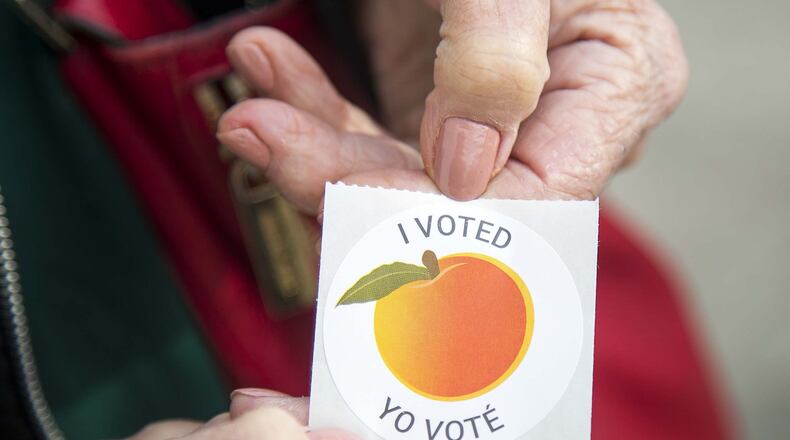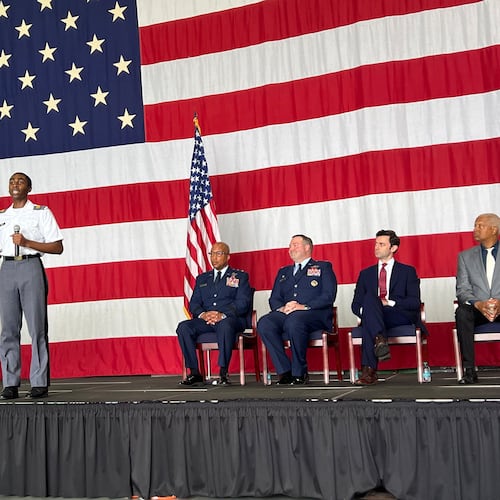A federal judge appeared skeptical Friday about ordering Georgia’s government to cover the postage cost of returning primary election ballots in a case arguing that it’s an unconstitutional poll tax.
U.S. District Judge Amy Totenberg was deciding whether to revoke the requirement for voters to pay for a 55-cent stamp on their absentee ballots, which are already being mailed to voters and tell them to "place sufficient postage here" before returning them for the state's June 9 primary.
“How do you do this without confusing people? How do you do this without creating a disparity in the voting process if some people are given stamps now when other hadn’t?” Totenberg asked during a four-hour court hearing held online via a Zoom videoconference. “There’s a host of problems.”
Totenberg didn't immediately issue a ruling Friday in the lawsuit, which says voters shouldn't have to pay to cast their ballots.
MORE: A map of coronavirus cases in Georgia
MORE: Real-time stats and the latest news on the coronavirus outbreak
The lawsuit by Black Voters Matter, a group founded in 2016 to increase African American voter registration and turnout, asks the judge to rule that the cost of voting by mail creates a barrier for those unwilling to risk buying stamps or voting in person during the coronavirus pandemic.
"The point is that folks shouldn't have to put themselves at risk," Cliff Albright, a co-founder of Black Voters Matter, said during the hearing. "Requiring this postage stamp creates a barrier to certain communities, low-income communities."
Even if Totenberg doesn’t require free ballot mailing in Georgia’s primary, she was also considering whether to do so in advance of the state’s Aug. 11 primary runoff and Nov. 3 general election.
Unprecendented numbers of Georgia voters plan to cast their ballots by mail in the primary, avoiding the risk of catching the coronavirus at in-person voting locations.
Secretary of State Brad Raffensperger mailed absentee ballot request forms to the state's 6.9 million active voters. More than 750,000 of them had already returned those requests through Thursday, according to state election data.
Attorneys for Raffensperger said the cost of a stamp won’t stop anyone from voting.
Voters can mail their absentee ballots, hand them in at precincts or insert them into drop boxes available in some counties. In addition, the U.S. Postal Service has said it will deliver ballots without stamps, even though ballot envelopes tell voters to use postage.
In-person voting locations must also remain open, both during three weeks of early voting and on election day, according to state law.
Declaring the price of a stamp a poll tax would be unprecedented, said Josh Belinfante, an attorney for Raffenpserger. It would cost the state up to $4.2 million to pay for absentee ballot postage, depending on turnout.
“This is something that’s been around for decades, and nothing has changed in this election that would cause anything different,” Belinfante said. “No one has indicated they’re absolutely precluded from voting.”
The U.S. Constitution’s 24th Amendment, ratified in 1964, prohibits conditioning the right to vote on payment of a tax.
The government's requirement for voters to pay the cost of ballot postage, even if it's just 55 cents, impedes their rights, said Sean Young, an attorney for the American Civil Liberties Union of Georgia, which is representing Black Voters Matter.
Especially during the coronavirus crisis, voters shouldn’t have to leave their homes to buy stamps, Young said. Ordering stamps online isn’t an option for voters who lack internet access.
“Postage stamps cost money, and that’s a poll tax,” Young said. “There are a lot of Georgia voters right now who have to pay the price of exposing themselves to COVID just to exercise their sacred right to vote.”
About the Author
Keep Reading
The Latest
Featured



